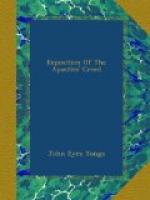So far there is here simply the statement that our Lord’s disembodied spirit passed to Hades, but the Apostle adds that He “preached to the spirits in prison,” and it is inferred by some that He preached repentance, but this is an assumption for which there is no Scripture warrant. We are not told what was the subject of Christ’s preaching. He had finished His work on earth, had atoned for sin, had overcome death and conquered Satan. Even angels did not fully know the work of grace and salvation which Christ accomplished for man, and it is not likely that the spirits of departed antediluvians and patriarchs understood its greatness. The least in the Kingdom of Heaven knows more than the greatest of patriarchs or prophets knew. While in the flesh they had seen His day afar off, and, as disembodied spirits, they knew that Messiah by suffering and dying was to work out their redemption, but before the work was finished neither men nor angels understood the mystery of it, and what is more likely than that the completion of His redeeming work was first made known to them in the spirit by the Redeemer Himself? If we accept this view, the preaching to the spirits in prison was the intimation to those already blessed, who had while on earth repented and believed, that Messiah by dying had brought in everlasting salvation for His people.
There is still a difficulty in Peter’s words. Christ is said to have preached to those who were disobedient in the days of Noah. Peter says that in the writings of Paul there are some things hard to be understood, but what he himself writes regarding Christ’s work in Hades is also difficult, and the passage has found a great variety of interpretations. It would seem to imply that Christ in the spirit carried a special message to the antediluvians who had been disobedient and had perished in the Flood. What that message was we are not told, and human conjecture may not supply what the Spirit of God has seen fit to conceal. While the passage is a difficult one, the inference is not warranted which some have drawn from it, that those who are disobedient to Christ and reject His Gospel may, though they die impenitent, nevertheless obtain salvation after death. The plain teaching of Scripture is that it is appointed unto men once to die, and after that the judgment.[123] And whatever the statement of Peter may mean, it does not sanction belief in purgatory or in universal restoration. Romanists teach that the department of Hades to which the spirit of our Lord descended was that in which dwelt the souls of believers who died before the time of Christ, and that the object of His descent was the deliverance and introduction into heaven of the pious dead who had been imprisoned in the Limbus Patrum, as they term that portion of Hades which these occupied. This they say was the triumph of Christ to which Paul refers in Ephesians iv. 8, when, quoting the 68th Psalm, he tells us that He ascended up on high, leading captivity captive.




